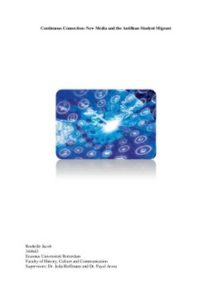“The computer [and newer forms of media providing instant access to digital content at any place and time] represent a new resource…that previously did not exist among migrants” (Hiller, Franz 2004: 731), changing their experience as a result of these advancements in technology, providing resources that were previously unavailable (Hiller, Franz 2004: 737). Ties to the countries of origin, formations and maintenance of relationships within a Diaspora have never been easier. The opportunity to develop new ties, nourish old ties, and rediscover lost ties has never presented itself to the migrant experience of the past (Hiller, Franz 2004: 731). Present migrants are no longer isolated and lonely, but in a position of connectivity, shifting migration trends to something global, producing diasporic groups connected by “culture, ethnicity, language, and religion” (Tsagarousianou 2004: 60).
This topic of research is about the use of these technological advancements, specifically forms of new media, in reproducing, transforming, and maintaining a cultural identity within the Antillean Diaspora in the Netherlands and keeping in touch with persons from and developments in their countries of origin, islands of the Netherlands Antilles. The idea of this research came about as a result of my personal experience as an international student and temporary member of the Antillean Diaspora in the Netherlands.
Since leaving my home in Aruba to continue undergraduate studies in Canada and now graduate studies in the Netherlands, I found myself using forms of new media more frequently to not only keep in touch with my parents and friends, cultural events and practices, but also to stay informed about developments on the island. I would stream local television shows, listen to online radio stations, and visit online newspaper websites. I felt an “extra” need to know what was going on for I did not want to miss out. I wondered if this experience was the same for migrants within their respective diasporic groups in host countries. What effect did new media have on their relationships with people and the familiarity that they left behind? Was there a way to theorise such migrant behaviours? A study of this nature examines the understanding of the media as a means of “maintaining relations within the respective groups of ethnic minorities” (Peeters, d’Haenens 2005: 209).
Thesis Erasmus Universiteit, Rotterdam, 2011: https://thesis.eur.nl/pub/11226

